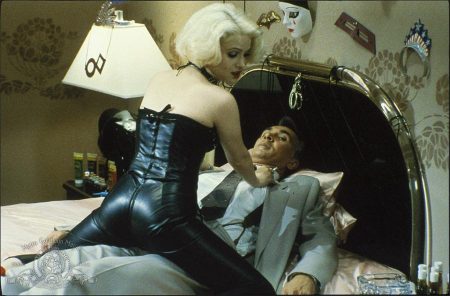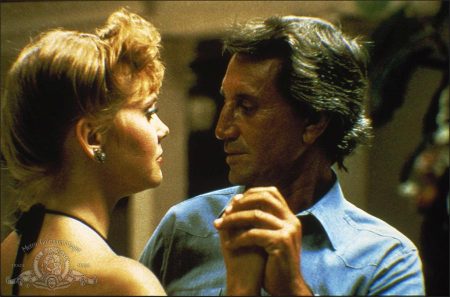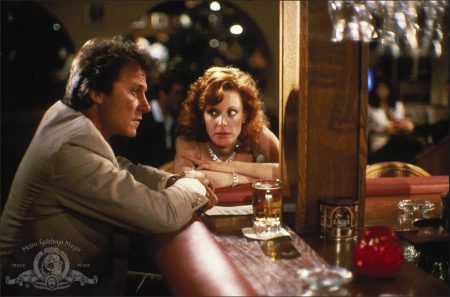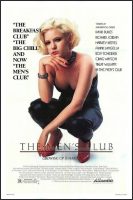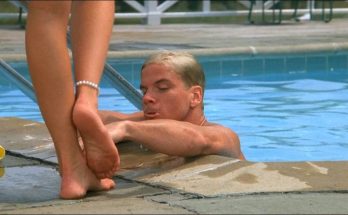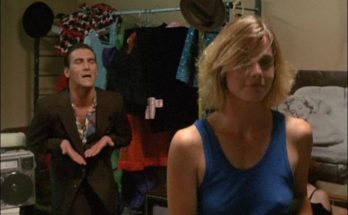Taglines: Growing up is hard to do.
The Men’s Club movie storyline. Californication. Six men meet in the home of a buddy psychotherapist to talk about themselves and women. The real estate agent (Keitel) remembers one who put her tongue in his mouth. The doctor (Williams) remembers the one who came between him and his strawberry dessert – he kicked her. Attorney Langella’s wife, thanks to analysis, discovered herself and scarpered with the furniture. Blah blah blah.
When they have eaten all the food, drunk all the wine, and wrecked the place throwing knives, they move on to an up-market San Francisco brothel, where they all make out/up/mistakes. All, that is, except the shrink, rapped over the head with a casserole by his irate spouse. Flashes of genuine intelligence and wit in the writing only render the moral nihilism of the whole high-tack enterprise all the more inexcusable.
The Men’s Club is a 1986 drama film directed by Peter Medak, based on the novel of the same name by Leonard Michaels. It stars Roy Scheider, Harvey Keitel, Frank Langella, Treat Williams, David Dukes and Richard Jordan. It is noted for a scene where Keitel (as Solly Berliner) assertively denies engaging in masturbation.
Review for The Men’s Club
If you thought today’s women needed support systems, wait till you see the seven weak sisters brought together by Leonard Michaels’ screenplay, from his 1982 novel. Having decided, for no better reason than as a pretext for a work of fiction, to become a club, these juveniles, who seem to range from the 30’s to the 50’s, meet at the Berkeley home of a pretty crazy psychotherapist (Richard Jordan) and take turns talking about their experiences with women.
It’s an estimable cast. Roy Scheider is a former baseball star, who is tough toward women but, well, vulnerable. Harvey Keitel is a tough yet vulnerable businessman. Frank Langella plays a somewhat clownish stuffed shirt, stuffed with romantic longings, and David Dukes plays a relatively wholesome, if irritable, homebody. Not only does he wear glasses, but so do his wife and his child, which shows you the kind of family they are. Treat Williams is supposed to be a doctor with a swinging bedside manner, and I’m not sure what Craig Wasson was supposed to be, other than friendly.
The danger of casting a movie of this sort with names of that sort is that the endeavor will become a series of feature turns. That’s the way the director, Peter Medak, apparently wanted it. Now and then, there is some horseplay involving the whole group or an angry exchange between a couple of them, but mostly we’re watching a set of shticks, some amusing, some not. It’s like being at an Actor’s Studio showcase.
Well, after talking for a while -mostly about wives who don’t perform up to par and other women who exceed expectations – the boys raid the refrigerator and make a shambles of the psychotherapist’s house in a scene that has to be seen to be disbelieved. The arrival of Stockard Channing, their hostess, puts an end to the festivities. The talented Miss Channing is given little to do, but she does get to hit Mr. Jordan over the head with a frying pan. As the blood streams down his face, he inquires, professionally, ”How do you feel about that?”
Mr. Michaels’ novel ended about here, but the movie moves on, as the group, lacking the injured Mr. Jordan, rolls off to the House of Affection, where they are warmly greeted by dolled-up women whose mirrored bedrooms have satin sheets. ”Do I remind you of your wife?” one of them asks Mr. Keitel. ”Not yet,” he says, ”complain about something.”
The Men’s Club (1986)
Directed by: Peter Medak
Starring: David Dukes, Richard Jordan, Harvey Keitel, Frank Langella, Roy Scheider, Craig Wasson, Treat Williams, Stockard Channing, Gina Gallego, Cindy Pickett, Gwen Welles, Penny Baker, Rebeccah Bush, Claudia Cron, Ann Dusenberry, Jennifer Jason Leigh
Screenplay by: Leonard Michaels
Production Design by: Ken Davis
Cinematography by: John Fleckenstein
Film Editing by: Bill Butler, David Dresher, Cynthia Scheider
Costume Design by: Marianna Elliott, Peter Mitchell
Set Decoration by: Thomas L. Roysden
Art Direction by: Laurence Bennett
Music by: Lee Holdridge
Distributed by: Atlantic Releasing Corporation
Release Date: September 19, 1986
Views: 280
